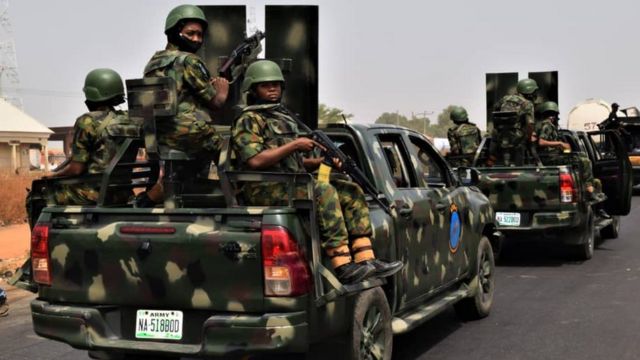
Food crisis: Military deploys troops in North-West, N’Central farms
Military personnel have reportedly been stationed throughout farms in the northern regions of the nation, particularly in the North West and North Central, according to Defence Headquarters.
The deployment was made to guarantee that farmers would have sufficient protection from bandits, terrorists, and other criminal elements, according to the military high command.
Bandits and terrorists have targeted farmers heavily, destroying their produce, robbing them of their livelihoods, and in some cases even killing them.
Our correspondent's count indicates that around 332 farmers nationwide lost their lives in the first quarter of this year. Comparing this to the same period in 2023 (January to June) last year, at least 128 farmers lost their lives. This is a huge rise.
Moreover, a recent report by SBM Intelligence, said farmers in the North paid an estimated sum of N139m as farm levies to bandits who demanded at least N224m between 2020 and 2023.
This comes as Nigeria faces its highest-ever food inflation rate, recorded at 40.87 per cent by the Nigeria Bureau of Statistics in June. In response, citizens have been calling for immediate action to address the growing hunger crisis in the country.
On Monday, Inspector-General of Police Kayode Egbetokun announced that the police had started patrols on farms in an effort to give farmers more confidence.
"In the Northeast, we have initiated farm patrols to restore farmers' faith in going back to their farms," he declared. The President is quite worried about it, and we're trying our hardest.
"However, I should also mention that Nigeria has a complicated and varied security environment."
However, the Director of Defence Media Operations, Maj Gen Edward Buba, said that the start of the rainy season marked the beginning of the troop deployment in an interview with our correspondent on Wednesday. He refrained from disclosing the precise quantity of soldiers tasked with the farms, though.
"With the start of the rainy season, troops are currently deployed in several of the northern, particularly in the NW and NC states to provide protection for farmers. The deployment has enabled several farmers’ access to their farm for a hitch-free planting season towards a bumper harvest,” Buba continued. The chairman of the All Farmers Association of Nigeria, Kabir Ibrahim, acknowledged that security presence had increased in farms across the nation, but he called on the government to eradicate insecurity to achieve food sufficiency. Ibrahim stated, "There is definitely some remarkable security improvement around our farms across the food baskets in the North Central and North West. We therefore appreciate the effort and unreservedly commend the administrations at all levels for that.
"Like Oliver Twist, we beg the government to end insecurity entirely so that food security can be achieved without incident."
Ibrahim noted that only drought and flooding might prevent farmers from having a bumper crop with the increased security.
"We should definitely" (have a bumper harvest), he declared. With the exception of flooding and drought, the improved security situation calls for an improved crop overall.
Nevertheless, our correspondent has discovered that, contrary to orders from Defence Headquarters, troops have not been sent to several states in the North West and North Central region.
In a phone conversation with one of our correspondents on Wednesday, Matthew Abo, the Benue State Commissioner for Information, Culture, and Tourism, stated that no military forces had been sent to the state to defend farmers.
As stated by the commissioner, the state Governor, Hyacinth Alia, had before now had positive discussions with the service chiefs at the height of insecurity in the state, which necessitated deployment of more security operatives.
He, however, said that in the past two weeks there was no deployment of military personnel to the state.
"Well, the governor travelled to Abuja, and we haven't talked about whether the state is getting military support to protect farmers," Abo stated. For the previous two weeks, no military personnel have been stationed in the state.
Kano State is not one of the states in the North West that is fighting banditry, according to a government official who spoke on condition of anonymity because he was not permitted to discuss the subject.
"Kano State does not have a dense forest, hence it is not one of the states where banditry is a problem.
"Kano State is not one of the states in the zone fighting with banditry, if you have been following reports on the issue of banditry," he declared.
In the interim, the Coordinating Secretary of Rice Farmers Association of Nigeria, Benue State, Sam Yua, said several farmers have been forced to leave the rural areas as a result of incessant killings by armed herders and relocated to urban areas.
The rice farmer pointed out that the state's insecurity is already having a domino effect across the nation.
"Now what they do is to drive away natives and occupy their (natives) communities," he bemoaned, referring to the fact that armed herders no longer returned to their states as they formerly did when the rainy season began.
For example, the people who lived on the 45 hectares of property I rented and planted rice have left, and the herders who now live there give our crops to their cattle.
Only two local government areas in the state—Sumaila and Garko—are impacted, according to Alhaji Abdurrashid Magaji, chairman of the All Farmers Association of Nigeria in Kano State.
He urged the nation's state governments to see to it that large-scale purchases of fertilisers and other inputs are made for sale to farmers at subsidised rates to boost irrigation farming in their respective states.
According to Maiwada Danmallam, the director of media for Katsina State and advisor to Governor Dikko Umar Radda, he is also unaware that soldiers are stationed in the state to safeguard crops and farmers.





